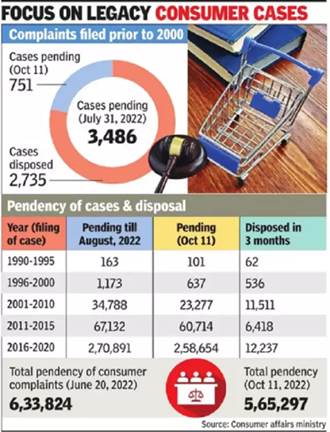Description

Copyright infringement not intended
In News
- Consumer commissions across the country have disposed of more than 68,587 cases in the past three-and-half months, bringing down the pendency rate by nearly 11%.
- In August 2022, the consumer affairs ministry initiated a five-month campaign for "faster and effective" disposal of cases.
- According to official data, nearly 5.6 lakh cases are still pending as on October 11.
- The Union Government has passed the Consumer Protection Act, of 2019, to ensure consumer protection and to reduce the pendency rate.

Consumer Protection Act, 2019
- The Act defined a consumer as a person who buys any goods or avails of service for final use.
- It does not include a person who buys a good for resale or a good or service for commercial purposes.
- It covers transactions through all modes including offline, and online.
- The Act clearly defined 6 Rights of consumers:
- Right to be protected against the marketing of goods and services which are hazardous to life and property.
- Right to be informed about the quality, quantity, potency, purity, standard and price of goods or services.
- Right to Choice among a variety of goods or services at competitive prices.
- Right to be heard
- Right to seek Redressal against unfair or restrictive trade practices.
- Right to Consumer Awareness
- Central Consumer Protection Authority (CCPA) promotes, protects and enforces the rights of consumers.
- It functions under the guidelines of The Minister of Consumer Affairs, Food and Public Distribution
- It regulates matters linked to the violation of consumer rights, unfair trade practices, and misleading advertisements.
- The CCPA has an investigation wing; they may conduct an inquiry or investigation into the case of violations of rules.
- Central Consumer Protection Authority (CCPA) functions;
- Inquiring into violations of consumer rights, investigating and taking appropriate action.
- It could pass orders to recall goods or withdraw hazardous services, and refund the price paid.
- It Issues directions to the concerned trader/ manufacturer/ endorser/ advertiser/ publisher to either discontinue a false or misleading advertisement.
- It imposes penalties on a manufacturer or an endorser of up to Rs 10 lakh and imprisonment for up to two years for a false or misleading advertisement. In case of a subsequent offence, the fine may extend to Rs 50 lakh and imprisonment of up to five years.
- It Issues safety notices to consumers against unsafe goods and services.
- Consumer Disputes Redressal Commissions (CDRCs) at the District, State, and national levels.
- Appeals from the State CDRC will be heard by the National CDRC.
- The final appeal to the Supreme Court.
- The District CDRC will entertain complaints where the value of goods and services does not exceed Rs 1 crore.
- The State CDRC will entertain complaints when the value is more than Rs 1 crore but does not exceed Rs 10 crore.
- Complaints with a value of goods and services over Rs 10 crore will be entertained by the National CDRC
http://timesofindia.indiatimes.com/articleshow/94903440.cms?utm_source=contentofinterest&utm_medium=text&utm_campaign=cppst
https://t.me/+hJqMV1O0se03Njk9















